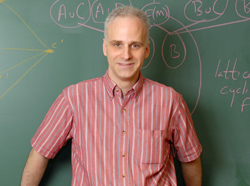|
Summer 2009
Faculty Focus: Joseph Bonin

Professor of Mathematics Joseph Bonin received the Oscar and Shoshana Trachtenberg Prize in Teaching at the 2009 Commencement ceremony.
|
By Julia Parmley
In February, GW Professor of Mathematics Joseph Bonin
learned from his department chair John Conway that he had
been nominated by students for the 2009 Oscar and Shoshana
Trachtenberg Prize in Teaching. The news rendered Dr. Bonin
speechless, but he did not expect to hear any more about it. And
he didn’t—until Executive Vice President for Academic Affairs
Donald Lehman called in April to congratulate him on receiving
the award.
“It really was a complete surprise,”
says Dr. Bonin. “I’ve been
aware that Students appreciate a well-organized course that is
structured so they can really learn, but I wasn’t before aware of
the depth of the impact I’ve had on some students. Obviously,
this is deeply gratifying and rather moving.”
Dr. Bonin came to GW in 1989 as an assistant professor of
mathematics, but he says it was a
field he came to by “fortunate circumstances. ”
While the subject did
not spark his interest in high
school, an inclination toward technical
fields led him to take linear
algebra as an undergraduate at
Assumption College in Worcester,
Mass. “At the start of the course, all
of the students really struggled with the assigned problems, most
of which required proofs,” he says. “Following our failure to solve
the problems, our teacher would solve them in elegant ways, with
arguments laid out so clearly and precisely that my natural reaction
was ‘I want to be able to do that.’ Precision and elegance
sparked my interest in math.”
Dr. Bonin earned a bachelor’s degree in math from Assumption
College in 1984 and graduated from Dartmouth College in 1989
with both his master’s degree and doctorate in math. He has
taught a variety of undergraduate and graduate courses at GW
during his tenure including abstract algebra, combinatorics and
elementary number theory, which he deems among his favorite
classes due to its study of properties of familiar objects, such as
positive integers.
Dr. Bonin says his range of classes reflects the broad training all
mathematicians receive. “Different parts of math are very interdependent
so you have to have a broad knowledge,” he says. “The more you
know, the more you can see connections. Mathematicians often do
their best work when they work between fields.”
Dr. Bonin’s thoughtful approach to teaching—including
adjusting his teaching style for each one of his classes—helps
keep the subjects “fresh.”
“One thing I focus on is connecting with each new group of
students,” he says. “I figure out how I can change my teaching to
get them involved. I encourage students to ask questions and make presentations on problems at the beginning of every class,
which can boost their interest and inspire them to do better
work.” Dr. Bonin also offers bonus problems that challenge students
to go beyond what is required on weekly homework.
Dr. Bonin’s research is in the field of matroid theory, a subject
that provides a general framework for studying notions such as
independence, closure and rank that arise in many areas of math,
including linear algebra and graph theory. While matroid theory
has important applications in physics, combinatorial optimization
and coding theory, among other areas, Dr. Bonin’s research
focuses on the pure theory, with geometry providing much of the
motivation for his work. “Some work in math is useful, but some
is just art—and, as in art, you don’t ask what you can do with it,”
says Dr. Bonin. “It’s just inherently fascinating. As in art, aesthetic
concerns are very important in
pure math.” He has published
numerous research articles in
matroid theory and routinely gives
invited lectures on the topic.
While he focuses on pure
theory, Dr. Bonin says that pure
and applied math work together in
a mutually enriching way, with the
result that math is behind much of what surrounds us. “Reliable
networks, whether electrical, communication or transportation,
require math in their design, as do computers and other
electronics, as well as our buildings and homes and most of the
things in them,” he says. “Everyone needs to understand the data
we encounter in the news related to health and public policy; for
instance, everyone needs to be able to see through the spin and
evaluate the validity of arguments in politics. Math is the model
subject for fostering such precise thinking.”
In addition to teaching and research, Dr. Bonin has taken on
administrative duties for the past three years as deputy
department chair and graduate committee chair. He supervised
the department’s move from Old Main to Monroe Hall in 2007
and helped create a post-baccalaureate certificate in math to
launch in the fall.
To wind down after a long day, Dr. Bonin enjoys reading in
Spanish, a language he began learning during a sabbatical at the
Universitat Polit`ecnica de Catalunya in Barcelona in 2002. On
the weekends he enjoys biking on the C&O Canal, visiting the
farmers market near his home in Arlington, Va., listening to
classical music and cooking. But teaching and research are what
Dr. Bonin finds most fulfilling.
“GW has a lot of good students and being in an interesting
city adds to the appeal,” he says. “I believe we attract a lot of great
people to GW.”
Send feedback to: bygeorge@gwu.edu |
|

|

